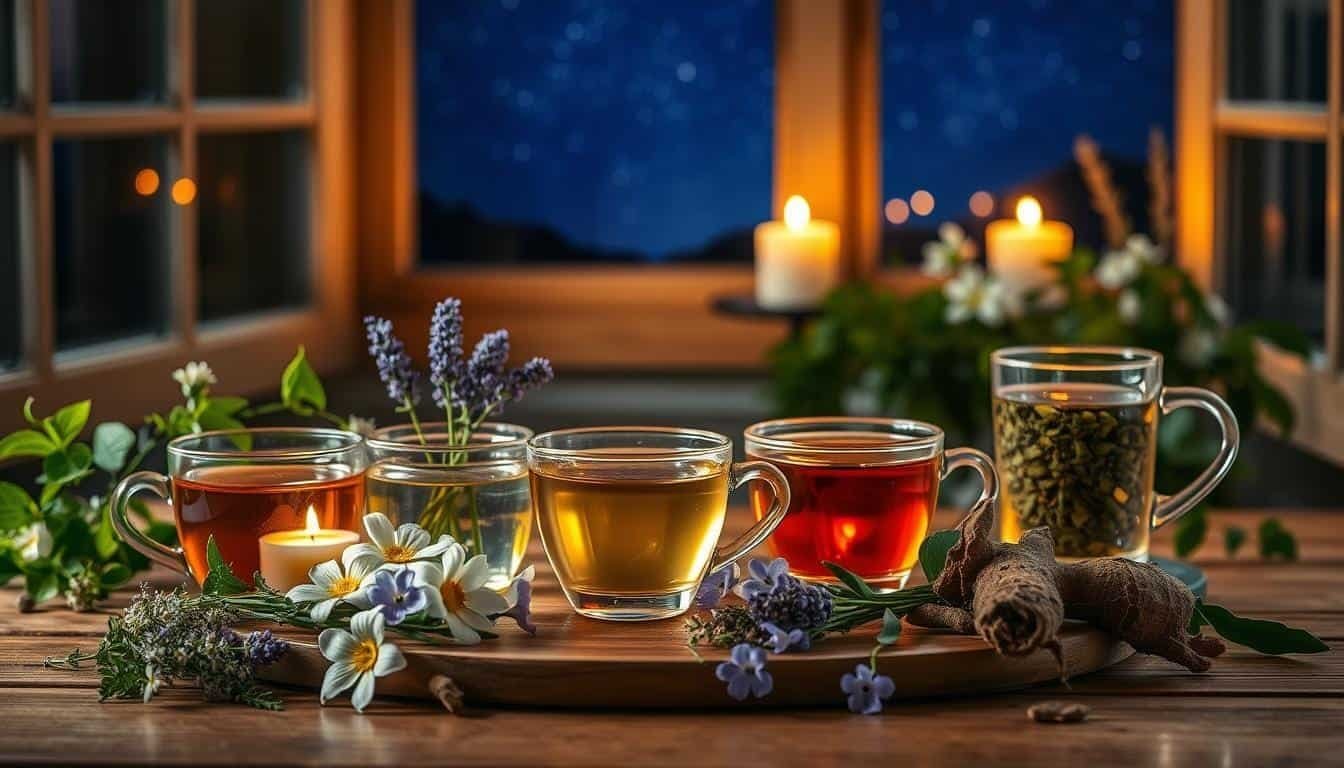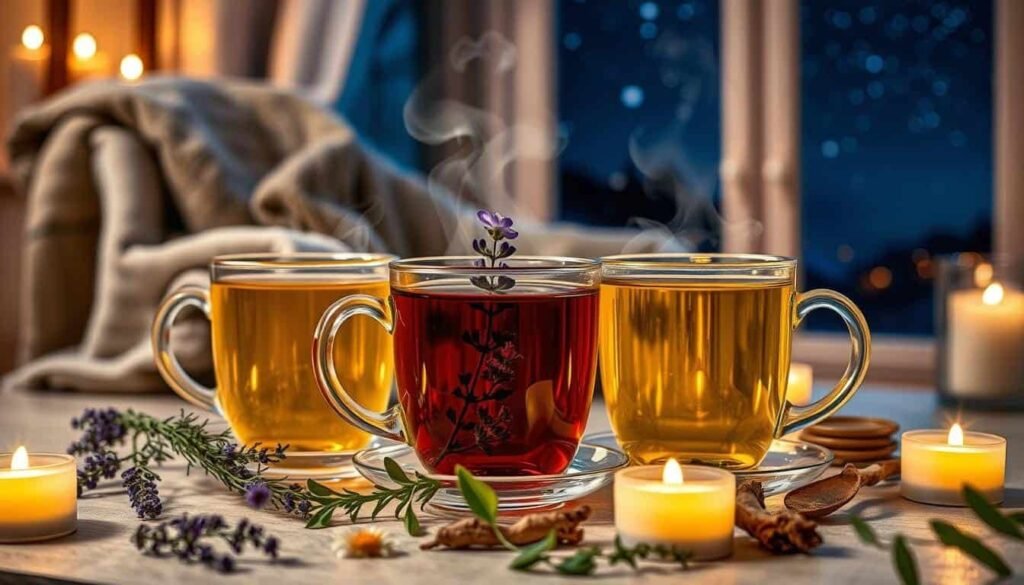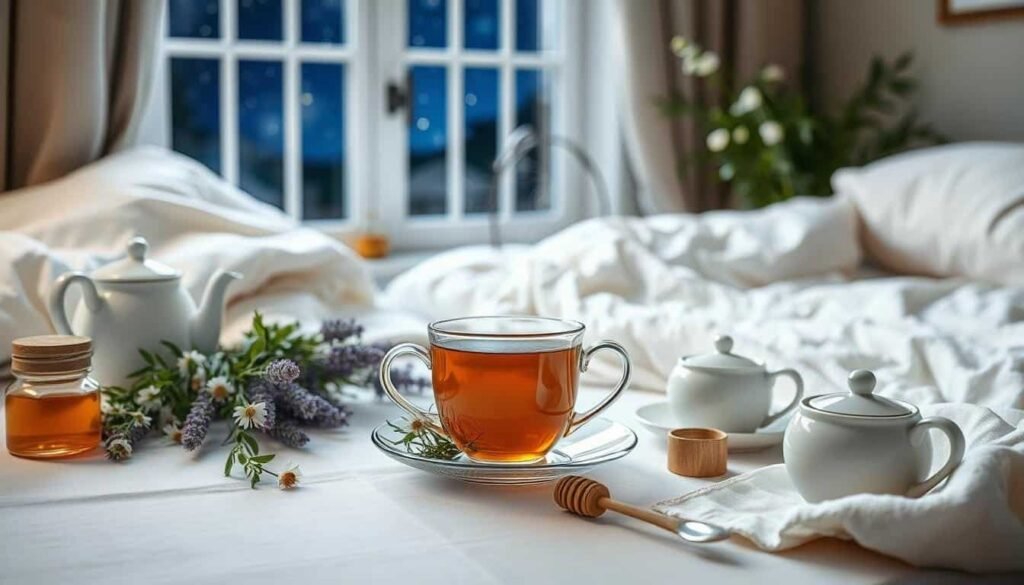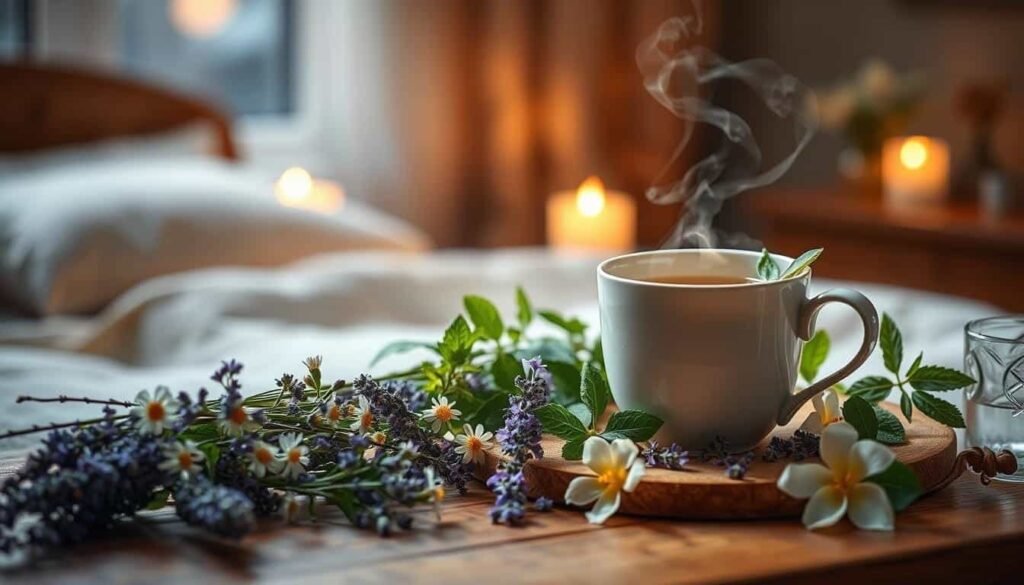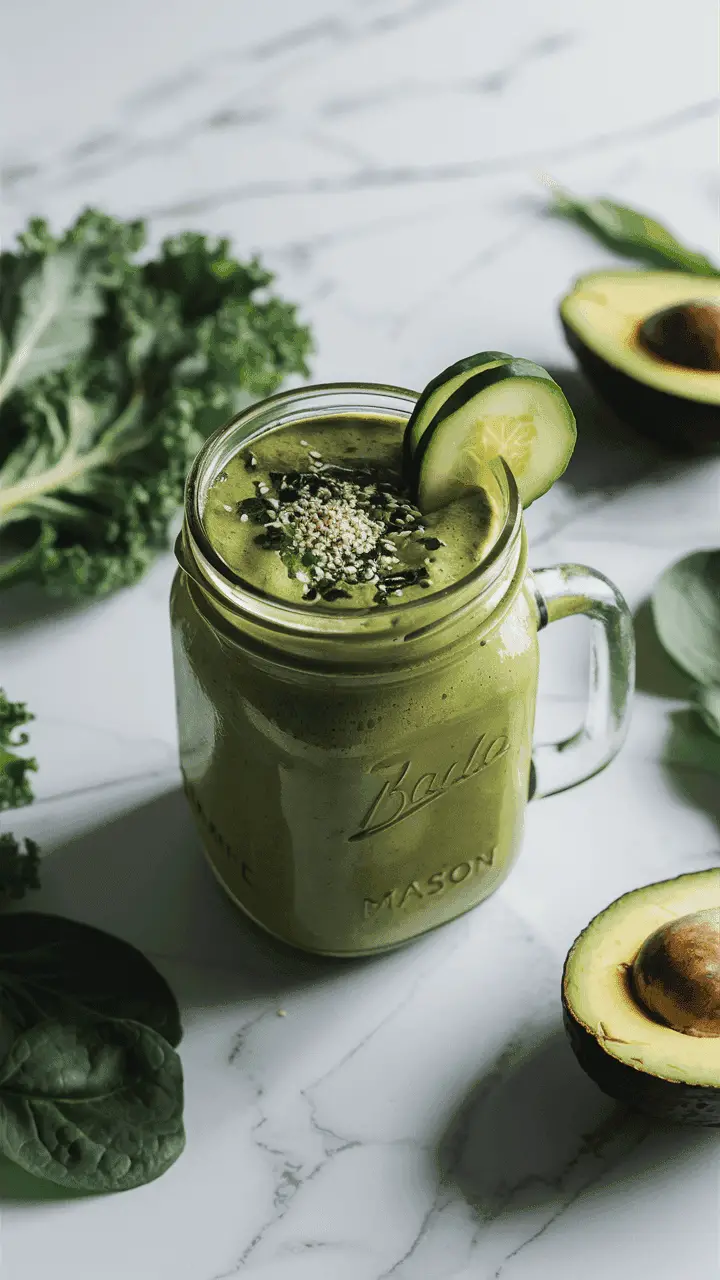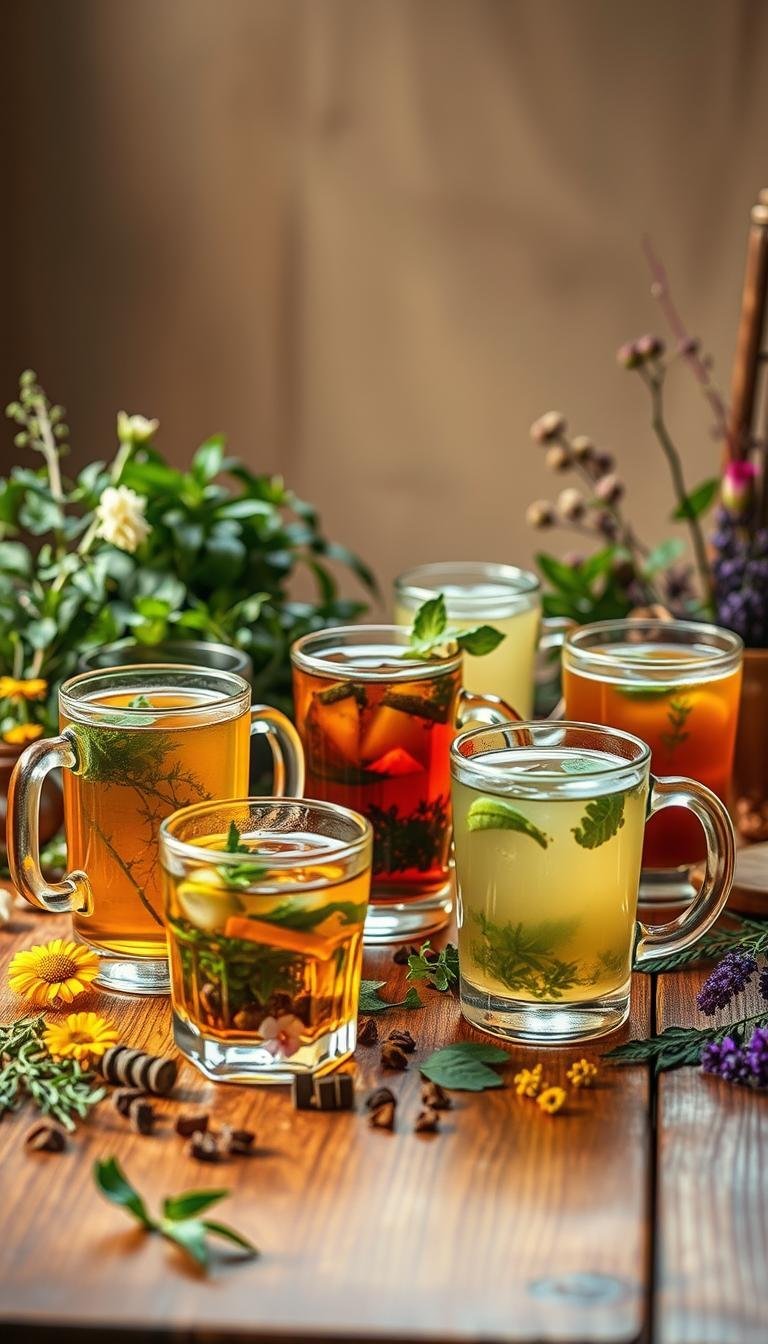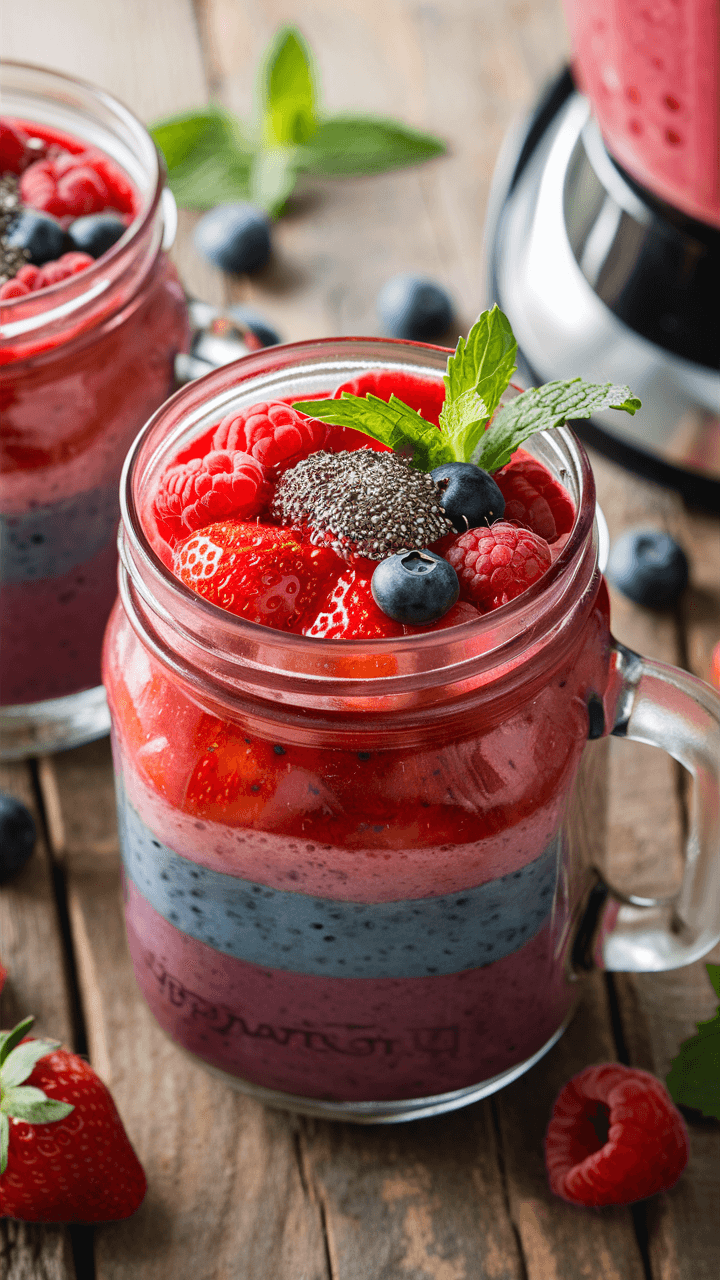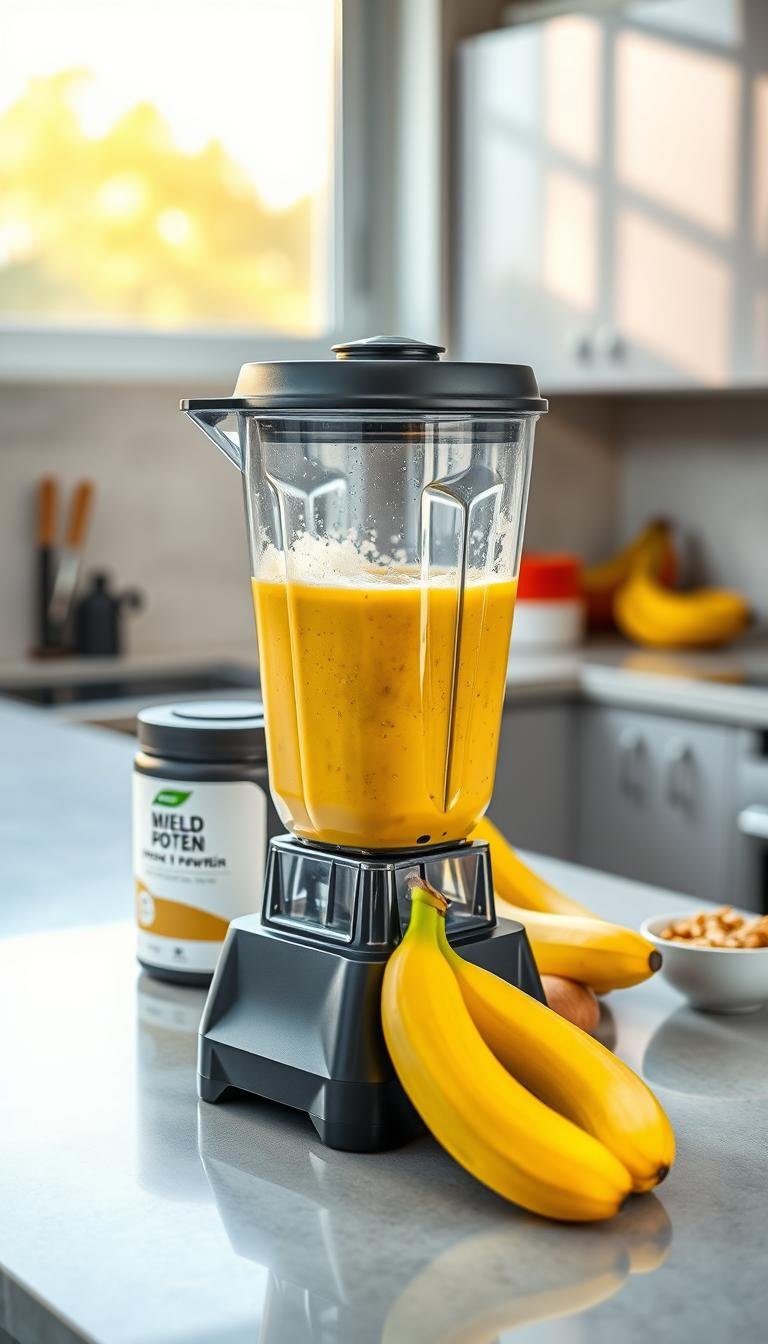(Hey! Some links in this post may be affiliate links — meaning I may earn a small commission if you buy through them, at no extra cost to you. As an Amazon Associate, I earn from qualifying purchases. I only share products I genuinely love and think you’ll find useful too. Read the full disclosure here).
Herbal teas for sleep are a natural way to fight insomnia. They offer a calming effect before bed. The best ones are made from natural ingredients that help you relax and sleep better.
Unlike traditional sleep aids, herbal teas are non-habit forming. They have few side effects. Many in the United States are choosing herbal teas for their insomnia relief.
Natural remedies like herbal teas are gaining popularity for insomnia relief. They offer a way to improve sleep without medication. Adding herbal teas to your bedtime routine can make you feel rested and refreshed.
Whether you need a calming tea or a soothing one to fall asleep, there are many options. Herbal teas can help you relax and sleep faster.
Contents
- 1 Why Choose Herbal Teas for Sleep?
- 2 Top Herbal Teas for Sleep
- 3 The Science Behind Herbal Teas and Sleep
- 4 Preparing Your Herbal Tea
- 5 Timing Your Tea Consumption
- 6 Creating a Sleep Routine with Herbal Teas
- 7 Potential Side Effects of Herbal Teas
- 8 Personalizing Your Herbal Tea Experience
- 9 Where to Buy Quality Herbal Teas
- 10 FAQ
- 10.1 What are the benefits of using herbal teas for sleep?
- 10.2 Which herbal teas are best for promoting better sleep?
- 10.3 How do herbal teas work to improve sleep patterns?
- 10.4 When is the best time to drink herbal tea for sleep?
- 10.5 Are there any potentially side effects or precautions to be aware of when drinking herbal teas for sleep?
- 10.6 Where can I find high-quality herbal teas for sleep?
Key Takeaways
- Herbal teas for sleep are a natural remedy for insomnia
- The best herbal teas for better sleep are made from natural ingredients
- Herbal teas are non-habit forming and have few side effects
- Natural remedies for insomnia are becoming increasingly popular
- Incorporating herbal teas into your bedtime routine can improve sleep quality
- Herbal teas can help you relax and fall asleep faster
Why Choose Herbal Teas for Sleep?
Herbal teas are known for their calming effects. They help relax the mind and body, making it easier to sleep. Calming herbal teas and sleep-inducing herbal teas are perfect for those with insomnia or sleep disorders.
Drinking herbal tea for relaxation calms the nervous system. This is great for people who find it hard to relax after a busy day. A cup of herbal tea before bed can help you feel calm and ready to sleep.
- Promoting relaxation and reducing stress
- Calming the nervous system and soothing the mind
- Improving sleep quality and duration
Calming herbal teas and sleep-inducing herbal teas are excellent for better sleep. Adding herbal tea for relaxation to your bedtime routine can make you feel calm. This makes it easier to fall asleep and stay asleep all night.
Top Herbal Teas for Sleep
There are many herbal teas for bedtime that can help you sleep well. Opting for organic herbal teas for sleep is a smart choice. They don’t have artificial additives or pesticides. Here are some of the best herbal teas for sleep:
These teas have been used for centuries to help people relax before bed. You can enjoy them hot or cold. Add honey or sugar for sweetness, or mix them with other teas.
Chamomile Tea
Chamomile tea is loved for its calming effects. It helps reduce stress and anxiety. It also soothes the mind and body, making it easier to fall asleep.
Valerian Root Tea
Valerian root tea is great for sleep. It has a natural sedative effect. This can help lower stress and anxiety, leading to a good night’s sleep.
Lavender Tea
Lavender tea is calming and can reduce stress and anxiety. It’s believed to improve sleep quality. This means you’ll wake up feeling refreshed and rested.
Passionflower Tea
Passionflower tea is a natural sedative. It helps lower stress and anxiety. It’s also thought to improve sleep quality, making your nights more restful.
The Science Behind Herbal Teas and Sleep
Herbal teas have been used for centuries to help with sleep. Research has shown how they work to improve sleep. The active ingredients in these teas help relax the body and enhance sleep quality.
Studies reveal that teas like chamomile and valerian root contain compounds that calm the brain. These compounds reduce anxiety and stress. This helps regulate sleep patterns and improves sleep quality. Some of the key ingredients in these teas include flavonoids, terpenes, and alkaloids, which positively affect sleep.
Key Ingredients in Sleep-Enhancing Teas
- Flavonoids: found in chamomile and lavender teas, which have a calming effect on the body
- Terpenes: present in valerian root tea, which helps to reduce stress and anxiety
- Alkaloids: found in passionflower tea, which has a sedative effect on the body
Understanding the science behind herbal teas and sleep helps us choose the right teas. Whether you’re looking for natural remedies for insomnia or better sleep, herbal teas are a good choice.
Preparing Your Herbal Tea
To enjoy herbal teas for sleep to the fullest, proper preparation is key. The right ingredients and brewing methods can greatly enhance your tea’s quality and effectiveness. Always choose organic, fresh, and potent herbs for the best results.
A well-prepared cup of calming herbal teas can transform your sleep. Here are some tips for the perfect cup:
- Use fresh, filtered water to prevent any impurities or contaminants from affecting the taste and quality of your tea.
- Choose the right brewing time and temperature to bring out the optimal flavor and benefits of your herbs.
- Consider adding a sweetener or milk to enhance the flavor, but be mindful of the calories and ingredients you’re adding.
By following these simple tips, you can make a soothing and effective cup of herbal teas for sleep. This will help you relax and prepare for a good night’s rest. Always use high-quality ingredients and experiment with brewing techniques to find what works best for you.
Timing Your Tea Consumption
Timing is key when using herbal tea for relaxation and insomnia relief. Knowing when and how much to drink is important. Drinking herbal tea at the right time can help you relax and get ready for sleep.
It’s best to drink herbal tea for relaxation 30 minutes to 1 hour before bed. This lets the tea’s calming effects work, making it easier to sleep. For teas that help with insomnia, drink a cup earlier in the day. This avoids any stimulating effects close to bedtime.
Best Times to Drink Herbal Teas for Sleep
- 30 minutes to 1 hour before bedtime for relaxation and calming effects
- Earlier in the day for insomnia relief herbal teas to avoid stimulating effects
How Much Tea Should You Consume?
The amount of herbal tea you should drink varies. Start with 1 cup and adjust as needed. Always follow the brewing instructions to get the most from your tea.
By timing your tea right and drinking the right amount, you can fully enjoy herbal tea’s benefits. This leads to better sleep and more rest.
Creating a Sleep Routine with Herbal Teas
Having a regular sleep routine is key to better sleep. Natural remedies for insomnia, like herbal teas, are very helpful. Drinking herbal teas for bedtime tells your body it’s time to sleep.
To make your sleep space better, try these:
- Meditation or deep breathing exercises
- Reading a book or listening to soothing music
- Taking a warm bath or shower
Creating a sleep-friendly mood is also important. Dim the lights, lower the noise, and keep your room cool. Adding herbal teas for bedtime to your routine can make you sleep better and feel great in the morning.
Combining Herbal Teas with Other Relaxation Techniques
Try different herbal teas and relaxation methods to see what works for you. Chamomile, valerian root, and lavender tea are great for sleep. Mixing these teas with other relaxation techniques can help you sleep better.
Setting the Mood for Sleep
A good sleep environment is vital for better sleep. A calm atmosphere and herbal teas for bedtime can help your body know it’s time to sleep. This way, you’ll wake up feeling refreshed and ready to go.
Potential Side Effects of Herbal Teas
Herbal teas for sleep can be a natural way to improve sleep quality. But, it’s important to know about possible side effects. Some teas can interact with medicines or make health issues worse. For example, valerian root tea can make antidepressants stronger, and chamomile tea can worsen allergies in some.
Before trying herbal teas, talk to a healthcare professional. This is very important if you have health issues or take medicines. They can suggest safe herbal teas for you.
When to Avoid Certain Herbal Teas
- Pregnant or breastfeeding women should avoid teas like peppermint and ginger. They can affect the uterus or milk production.
- People with allergies or sensitivities should be careful with new teas. Some can cause allergic reactions or interact with medicines.
- Those with conditions like high blood pressure or diabetes should talk to their doctor. Certain teas might affect their condition.
Consult a Healthcare Professional
It’s key to talk to a healthcare professional about sleep-inducing herbal teas. They can give you personalized advice. This way, you can enjoy the benefits of herbal teas safely and avoid risks.
Personalizing Your Herbal Tea Experience
Everyone’s needs are different when it comes to calming herbal teas for sleep. To get the most out of your herbal tea, think about making it your own. You can mix different herbs to create a blend that’s just right for you. For example, try mixing chamomile and lavender for a tea that’s both soothing and calming.
Mixing Different Herbs for Tailored Effects
To find your perfect blend, start by trying out different herbs. Some great options for sleep include valerian root, passionflower, and lemon balm. You can mix these herbs in different ways to find what works best for you. Here are some tips to help you:
- Start with a base herb, like chamomile or peppermint, and add smaller amounts of other herbs to create a unique blend.
- Experiment with different ratios of herbs to find the perfect balance for your needs.
- Keep a journal to track your progress and note which blends work best for you.
Finding Your Perfect Sleep Brew
Once you’ve found your ideal blend, it’s time to perfect your brewing technique. Here are some tips for making the perfect cup of herbal tea for relaxation:
- Use fresh, high-quality herbs for the best flavor and potency.
- Adjust the steeping time to suit your taste preferences.
- Experiment with different temperatures to find the perfect balance for your herbs.
Where to Buy Quality Herbal Teas
Starting your journey to better sleep with organic herbal teas for sleep is exciting. It’s key to find trusted places for the best products. You can shop online or visit local markets for a variety of choices.
Online Retailers for Organic Herbal Teas
Looking for top herbal teas for bedtime? Check out Teavana, Traditional Medicinals, or Celestial Seasonings online. These brands focus on quality, using organic and sustainable ingredients.
Local Shops and Farmer’s Markets for Fresh Options
Love exploring local shops and farmer’s markets? You’re in for a treat. Small tea makers and artisans offer unique organic herbal teas. They provide fresh, flavorful options to improve your sleep.
When buying herbal teas, always look for quality and clear ingredients. With the right choice, you’ll enjoy the sleep benefits these natural drinks offer.
FAQ
What are the benefits of using herbal teas for sleep?
Herbal teas offer a natural way to better sleep. They have compounds that calm and help you sleep. These teas also have antioxidants and nutrients for health.
Which herbal teas are best for promoting better sleep?
Top teas for sleep include chamomile, valerian root, lavender, and passionflower. They help reduce anxiety and improve sleep.
How do herbal teas work to improve sleep patterns?
Herbal teas have compounds that affect sleep-wake cycles. Chamomile and lavender promote calmness. Valerian root may increase GABA, a sleep-inducing neurotransmitter.
When is the best time to drink herbal tea for sleep?
Drink herbal tea in the evening, 1-2 hours before bed. This helps you relax before sleep. Limit it to 1-2 cups to avoid side effects.
Are there any potentially side effects or precautions to be aware of when drinking herbal teas for sleep?
Herbal teas are mostly safe, but be cautious. Some, like valerian root, may interact with meds or cause drowsiness. Always check with a healthcare professional.
Where can I find high-quality herbal teas for sleep?
Find quality herbal teas online, at local shops, or farmer’s markets. Choose organic, loose-leaf teas or natural tea bags. Avoid teas with added sweeteners or artificial flavors.

